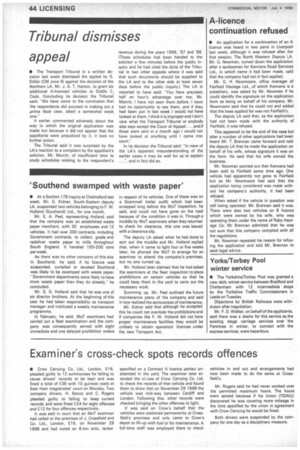'Southend swamped with waste paper'
Page 46

If you've noticed an error in this article please click here to report it so we can fix it.
• At a Section 178 inquiry at Chelmsford last week, Mr. G. Kidner. South-Eastern deputy LA, suspended two vehicles belonging to F. W. Holland (Southend) Ltd., for one month.
Mr. E. A. Peel, representing Holland, said that the company was an established waste paper merchant, with 30 employees and 12 vehicles. It had over 200 contracts, including Government contracts, to collect, grade and redeliver waste paper to mills throughout South England. It handled 150-200 tons per week.
As there was no other company of this size in Southend, he said, if its licence was suspended. curtailed or revoked Southend was likely to be swamped with waste paper. "Government departments were likely to have more waste paper than they do already," he concluded.
Mr. G. G. Holland said that he was one of six director brothers. At the beginning of this year he had taken responsibility as transport manager and instituted a weekly maintenance programme.
In February. he said, MoT examiners had carried out a fleet examination and the company was consequently served with eight immediate and one delayed prohibition orders in respect of its vehicles. One of these was on a Scammell trailer outfit which had been scrapped long before the MoT inspection, he said, and could not have gone on the road because of the condition it was in. Through a muddle by MoT examiners when they returned to check for clearance, this one was issued with a clearance slip.
The deputy LA asked what he had done to sort out the muddle and Mr. Holland replied that, when it came to light four or five weeks later, he phoned the MoT to arrange for an examiner to attend the company's premises, but no one turned up.
Mr. Holland later claimed that he had asked the examiners at the fleet inspection to place prohibitions on certain vehicles so that he could keep them in the yard to carry out the necessary work.
Summing up, Mr. Peel outlined the future maintenance plans of the company and said it now realized the seriousness of maintenance.
Mr. Kidner said that although he accepted this he could not overlook the prohibitions and if companies like F. W. Holland did not have proper maintenance facilities they would be unlikely to obtain operators' licences under the new Transport Act.




























































































































































